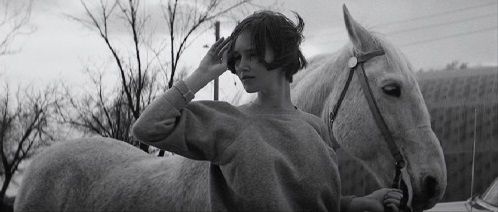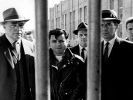Eye For Film >> Movies >> In Cold Blood (1967) Film Review
In Cold Blood
Reviewed by: Jennie Kermode

In 1959 Herbert, Bonnie, Nancy and Kenyon Clutter were brutally murdered in their Kansas farmhouse. Writer Truman Capote was among the journalists who gathered at the scene as the search for the killers began, but unlike the others, he stuck around during that search and through everything that happened afterwards. In 1966, he published In Cold Blood, one of the most influential books in American history. Work immediately began to turn it into a film, and this was released the following year - parts of it shot in the very house where the murders took place.
It's a powerful legacy for any film to contend with. Director Richard Brooks does an extraordinary job in creating a work that stands out in its own right, a film that grips right from the beginning with its noirish visuals and unmistakable sense of menace. Quincy Jones' score veers between aggression and a kind of melancholy detachment in keeping with Capote's work. We follow the two killers as they travel toward their fateful destination propelled by a rumour of secret riches, already showing the childish streak that will prove so destructive and will also be raised in their defence.

Brooks' version of the tale largely cuts out the figure of the writer and the intriguing dynamic between him and the killers which is pivotal to the book (and in Bennett Miller's 2005 film Capote), bringing him only when a voiceover is needed to condense the later part of the tale. The film hinges on the performances of Scott Wilson as Dick and, more prominently, Robert Blake as Perry, going into a dangerous situation with something dangerous inside him. The variety of situations in which we see them lets us get to know them as people before being confronted by the full horror of their deeds. We also get an insight into the complexity of their relationship, and although the Hays Code prevented Brooks from addressing it directly, there are several hints at the sexual tension between them, both direct and in the form of allusions made by a state psychiatrist. As in others of his films, Brooks handles this subject with a notable lack of sensationalism, and many other contemporary theories as to why the men went astray are given equal or greater weight.
It's Blake who is the real standout in the film and whose performance here, along with Capote's book, would be significant in changing American attitudes to the death penalty - ironic as he would himself be accused of murder (of his second wife, another Bonnie) in 2002. Allowing some sympathy for the killers does nothing to reduce the impact of the murders as depicted here, however. Watching the young Brenda Currin, who plays Nancy, stroking the real Nancy's horse reminds us that grief for the Clutters was still raw at the time of the film's release. In the context of this it feels as much a statement by the local community as by Brooks and Capote; an attempt, through preserving their story, to give them back something of the life that was taken from them. Nancy would be 71 if she were alive today. One of the last things her friends remember her telling them is how much she was looking forward to going to the cinema.
Reviewed on: 31 Jan 2015
















